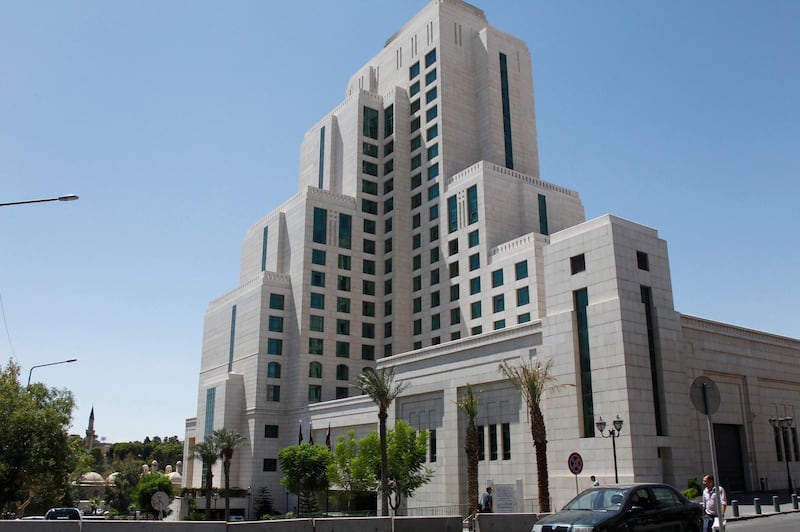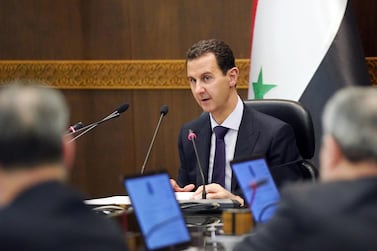Four Seasons Hotels and Resorts has dropped its Damascus branch, just weeks after the United States put sanctions on owner Samer Foz.
An employee of the hotel confirmed to The National that the hotel had been "disconnected from the chain", but said that the outlet itself would not be closing.
It remains unclear whether the hotel will change its name and Four Seasons Limited did not immediately respond to a request for comment. A statement on its website as of Thursday said "the hotel is no longer managed by Four Seasons Hotels and Resorts".
The employee also said that rooms were still available for booking, starting at €487 (Dh2,000) a night.
The US sanctions on Mr Foz, as well as two of his sons and 13 people and organisations associated with him, followed a similar move by the European Union six months earlier.
He is accused of war-profiteering and doing business with the regime of President Bashar Al Assad.
In a press release published on June 11, the US Treasury accused Mr Foz of having leveraged “the atrocities of the Syrian conflict into a profit-generating enterprise”.
“This Syrian oligarch is directly supporting the murderous Assad regime and building luxury developments on land stolen from those fleeing his brutality," said Sigal Mandelker, undersecretary of the Treasury for Terrorism and Financial Intelligence, at the time.
Mr Mandelker was referring to Marota City, a luxury development project on the outskirts of Damascus.
According to analysts familiar with Mr Foz, the controversy and negative press brought by the US sanctions is likely to have prompted the Four Seasons to severe ties with its Damascus outlet.
Mr Foz, who is reputedly close to the Syrian regime, bought a majority stake in the hotel last year from Alwaleed bin Talal, a leading Saudi Arabian investor, who was at the time detained during an anti-corruption campaign.
The deal’s value was not made public, but the Financial Times reported that the Damascus transaction was higher than the sum Mr Talal received for his stake in the Beirut Four Seasons hotel, which was valued at US$115 million and also sold while he was detained.
A little-known figure at the time, Mr Foz has been attracting more scrutiny over the past year.
Analysts said the discontinuation could also have occurred if the outlet’s quality was not seen to be meeting the chain’s standard.
The latest customer review on Trip Advisor says that the Four Seasons was the “best hotel” and that it had managed to keep a “high standard”.
In the 1990s, French-owned hotel chain Le Méridien cut ties with its branch in the coastal city of Lattakia because it was too difficult to work with the Syrian Ministry of Tourism.
Built by Mr Talal and opened in 2006, the Four Seasons is the Syrian capital’s most luxurious hotel and a symbol of Gulf investment in the country in the 2000s.
“Bashar wanted to transform the Syrian capital with Gulf money”, said Fabrice Balanche, assistant professor at Lyon University in France and a Syria researcher.
“Entire luxury neighbourhoods were supposed to spring out of the ground. Apart from the Four Seasons, nothing serious went ahead.”
For years, fighting in Syria’s civil war raged just a few kilometres away. UK tabloid the Daily Mirror called the hotel “heaven on the edge of hell” in 2016.
To ensure maximum security, the hotel’s management transformed the Four Seasons into a “real bunker”, says Mr Balanche, “with temporary concrete walls all around it”.
This made it popular with employees from international NGOs, and particularly United Nations staff.
According to Bloomberg, UN staff ran up a $9.5 million bill at the Four Seasons in 2016, prompting criticism from Syrian activists for distributing funds to Mr Al Assad’s allies. At the time, Bloomberg reported that the hotel was co-owned by Syria’s tourism ministry.
Fadwa Baroud, public information officer at the UN in Damascus, said that “while unilateral and multilateral economic restrictions have been adopted by some governments and organisations against entities and individuals in Syria, the UN is only required to abide by the UN Security Council’s sanctions regimes”.
However, the UN “continues to search for alternative locations in the city that are cost effective and ensure the safety of staff".






